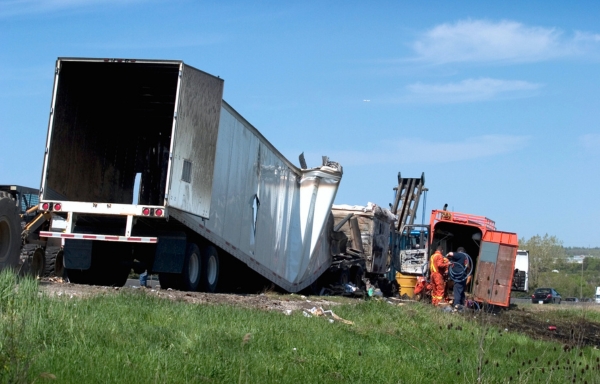Trucking Company Sued for Cargo Damage

Case Summary: A truckload of peanut butter was declared a total loss upon arrival. The shipper was an ingredient company, and the consignee was a cookie factory. The cookie factory demanded reimbursement from the logistics broker, who, in turn, filed a claim against the trucking company.
The logistics broker alleged that the cargo loss was due to poorly maintained equipment and/or poor driver performance. The trucking company denied the claim, calling the loss the fault of the shipper. In response, the logistics broker filed a lawsuit, and the trucking company’s insurance carrier retained an expert in packaging and cargo securement.
Expert Analysis: The peanut butter was packaged in 5-gallon plastic pails closed with snap-on lids. The pails were arranged onto pallets in 4 X 3 X 3 tiers, equaling 36 pails per pallet. Each pallet load was stretch-wrapped, and some had strapping. The trailer was loaded with 29 of these pallets, which were loaded 2-cross. Photographs taken upon arrival at the subject destination showed that:
- Pallets loads had come apart throughout the trailer.
- Many of the plastic pails had been punctured.
- Peanut butter had spilled throughout the trailer.
The same photographs showed that the cargo had not been secured, i.e., blocked and braced inside the trailer. The expert utilized the pallet dimensions to calculate amounts of voids across the width of the trailer and along the length of the trailer. As a result of those voids, the cargo had been free to shift.
It is known throughout the shipping industry that cargo transported in a trailer encounters physical forces, such as shock, vibration, and compression. Unless the cargo has been secured properly, these forces will cause the cargo to shift. The longer the haul, the longer the time for an unsecured load to shift and to incur damage. The at-issue haul was from Missouri to Arizona.
The Federal Motor Carrier Safety Administration (FMCSA) provides Cargo Securement Regulations that set performance criteria to promote roadway transportation safety and cargo protection. The regulations leave the choice of securement methods to the shipper, and require that a driver inspects a load prior to starting the haul and periodically during the haul. These requirements, however, are contingent on the driver’s ability to make such inspections.
In the at-issue shipment, the trailer already had been loaded and sealed when the driver arrived in his tractor at the ingredients company. The driver, therefore, was relegated to making the coupling and driving away. A seal must remain intact until broken at destination by the consignee.
To address the allegation of poorly maintained equipment, the expert reviewed the maintenance records of the subject tractor and trailer, which were found to be consistent with industry norms. Regarding the allegation of poor driver performance, the expert reviewed the employee file of the driver and found it non-concerning.
Opinions & Conclusion: The direct and proximate cause of the cargo damage was the absence of load securement. It constituted a breach of FMCSA Cargo Securement Regulations and a breach of industry standards and of industry best practices. There are a variety of proven ways to effectively secure cargo within a trailer.
Result: Following the expert’s provision of a written report and testimony via deposition, the case settled.


